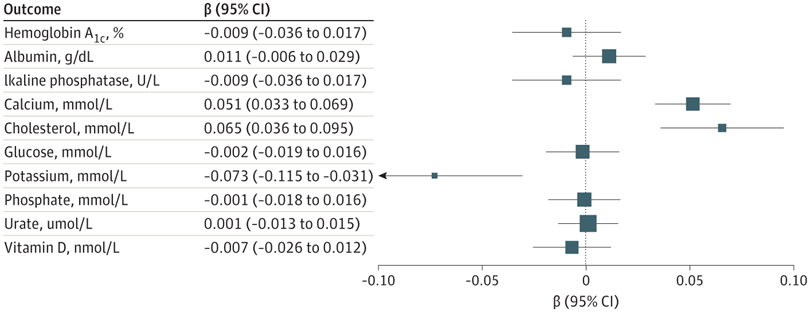
Click to Enlarge: Association of Genetic Proxies of Thiazide Diuretics With Serum Laboratory Values. The sizes of boxes indicate the precision of the effect estimate. Source: JAMA Network Open
NASHVILLE, TN — Using thiazide diuretics is associated with statistically significant lower odds of developing kidney stones, which supports the use of the products for kidney stone prevention, according to a recent study.
The genetic association study published in JAMA Network Open determined whether there is an association between genetic proxies of thiazide diuretics and the risk of kidney stones. Study authors were affiliated with the VA Tennessee Valley Healthcare System and Vanderbilt University Medical Center, both in Nashville, TN.1
Kidney stones affect nearly 10% of the world’s population, but therapeutics are limited, the study reported. Thiazide diuretics, which reduce the excretion of urinary calcium, “are recommended by international guidelines for the prevention of calcium kidney stones with long-term safety data, but a recent clinical trial cast doubt on their effectiveness,” Adriana Hung, MD, MPH, medical director of Dialysis Services at VA Tennessee Valley Healthcare System, told U.S. Medicine.
Those findings motivated the research team to study this topic further, Hung wrote in an email. She also is a nephrologist and epidemiologist at Vanderbilt University Medical Center.
The study included more than one million patients from around the world, the researchers pointed out, but most participants were veterans involved in the VA Million Veteran Program (MVP), which is now the world’s largest and most diverse biobank.
Genetic proxies of thiazide diuretics “were genetic variants in the thiazide-sensitive sodium chloride cotransporter gene associated with systolic blood pressure, and genetic proxies of β-blockers and systolic blood pressure served as negative controls,” the study explained.
Genetic proxies of thiazide diuretics were derived from the International Consortium for Blood Pressure (ICBP). Kidney stone cases and controls were derived from the MVP, UK Biobank and the FinnGen study. The study’s main analysis included up to 1,079,657 individuals, including 50,832 kidney stone cases and 1,028,825 controls, according to the authors.
“Kidney stone disease is common among military veterans,” Hung said. “This may be due to their unique environmental exposures and stressors, varying diet and lifestyle habits and possibly increased genetic predisposition. It’s important to consider these unique aspects when analyzing health outcomes for veterans.”
“Thiazide diuretics are a common class of blood pressure medications, and they may also prevent kidney stones. Using genetic evidence, we showed that genetic proxies of thiazide diuretics were associated with a 15% lower risk of kidney stone disease,” she added.
The results are significant, because the study used “genetic data to estimate a long-term medication effect,” study authors suggested.
“Our study suggests that thiazide diuretics may be effective in preventing kidney stones over a person’s lifetime,” Hung said.
The study also found that “genetic proxies of thiazide diuretics were associated with higher serum calcium and total cholesterol, but lower serum potassium. Genetic proxies of β-blockers and systolic blood pressure were not associated with kidney stones,” the authors explained.
Hung is the principal investigator for a Clinical Science Research and Development grant from the VA titled “Genetics of CKD and Hypertension-Risk Prediction and Drug Response in the MVP.” She also is the MVP local site principal investigator.
As a physician, Hung has observed that kidney stones are quite common, and painful, for veterans. When advising patients, she suggested that healthcare professionals “recommend diet and lifestyle changes to prevent kidney stone disease.”
Kidney Stone Prevention
“Staying hydrated and limiting salt is paramount,” Hung said. “And for some patients with calcium kidney stones, I do recommend thiazide diuretics for kidney stone prevention.”
To understand the potential efficacy of thiazide diuretics, alternative approaches that use existing data sets are needed. This study used Mendelian randomization, “a method for investigating potential causal relationships between exposures and disease outcomes, which can investigate the association between naturally occurring genetic variation in drug targets and disease risk,” the authors explained.
Mendelian randomization is less subject to “unmeasured confounding or reverse causation biases that can occur in observational studies,” according to the authors. This approach “provides an additional level of evidence for the preventive potential of thiazide diuretics in kidney stone disease,” they said.
In this study, the MVP included a majority of men (92.6%) with a mean age of 64 years, systolic blood pressure of 129 mm Hg, diastolic blood pressure of 77.7 mm Hg, and body mass index of 30.1 with high prevalence of hypertension (60.1%) and diabetes (27.3%), according to the study.
Limitations of the study include the “MVP cohort consists primarily of older, male veterans who may have different risk factors for urinary calculus than the general population,” the researchers pointed out. Also, the “generalizability of the results are limited because the drug proxies obtained from the ICBP, the largest genetic study of blood pressure traits available, were derived from European ancestry individuals,” they explained.
In addition, “Mendelian randomization relies on multiple assumptions, including the validity and independence of instrumental variables,” the authors added, saying they can’t “definitively show the variables were independent of the exposure-outcome relationship or the outcome itself.”
- Triozzi JL, Hsi RS, Wang G, Akwo EA, et. al. VA Million Veteran Program. Mendelian Randomization Analysis of Genetic Proxies of Thiazide Diuretics and the Reduction of Kidney Stone Risk. JAMA Netw Open. 2023 Nov 1;6(11):e2343290. doi: 10.1001/jamanetworkopen.2023.43290. PMID: 37962888; PMCID: PMC10646726.

